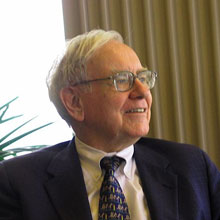Article by Investment U

Naturally, when Warren Buffett speaks, the rest of us listen. Unfortunately in this case, his words don’t appear to be matching his actions…
Just about everybody has heard of the “Buffett Tax” by now. Also known as the “Billionaire’s Tax” or the “Buffett Rule,” it seeks to establish a minimum 30% tax rate on Americans whose household income equals $1 million or more.
On Monday evening, the Democrat-controlled Senate struck the proposition down 51-45. Despite the majority in favor, the “Buffett Rule” failed to gain the 60 votes it needed to pass, and that was even with Maine’s Susan Collins, a Republican, approving it.
According to a recent Gallup poll, approximately 60% of Americans supported the added tax against “the rich,” which means that a majority of Americans are disappointed with Tuesday morning’s news. That includes The Christian Science Monitor’s Brad Knickerbocker, who recently praised the Buffet Rule as:
“… a wonderful political device – a call to even out the tax burden in a way that picks the pockets of those ‘millionaires and billionaires’ President Obama keeps talking about while evening things out for the vast American middle class. It’s very easy to understand, especially in contrast to a tax code requiring battalions of lawyers to navigate. And it has this wonderfully avuncular fellow for whom it’s named.”
That “avuncular fellow” is of course the legendary investor Warren Buffett. Nicknamed the “Oracle of Omaha,” Buffett runs a supremely successful business buying up undervalued companies and turning them into real moneymakers.
If his accumulated billions don’t testify to his accomplishments enough, his Berkshire Hathaway stock – which is valued at over $119,000 – certainly does. Over the last few decades, that holding company has returned more than 1,000%, and Buffett’s personal $105,000 investment is now worth tens of billions.
Naturally, when Warren Buffett speaks, the rest of us listen. Unfortunately in this case, his words don’t appear to be matching his actions…
Buffett Says He Supports Higher Taxes for the Rich
Last year, Warren Buffett did a lot of speechmaking, mainly about the tax proposal that quickly came to bear his name.
It all started with a piece published by The New York Times, where he aired his thoughts on how rich people like him weren’t paying nearly as much in taxes as they should be, especially when the middle and lower classes were struggling so badly.
Many people construed his initial message and subsequent crusade as noble and selfless. But actions speak a lot louder than words, and the truth is that Buffett’s actual business decisions simply don’t match up with his verbal declarations.
Now part of what makes Buffett such an excellent businessman is that he knows how to read the signs, both when it comes to the economy and public sentiment. (It also doesn’t hurt that, according to Peter Schweizer in his book, Throw Them All Out, Buffett also has powerful crony capitalist ties to Congress.)
So he was very well aware that the Occupy Wall Street movement was making the news every other day in 2011, while the remaining space went to the struggling economy and national deficit. As one of the wealthiest men in the world, he could have easily come under public condemnation in that overarching outcry for excessive spending.
He therefore simply took the necessary steps to protect himself from that possibility. Yet for all of his talk about greater taxation, Buffett and the IRS are anything but the best of friends, as evidenced by their legal history of butting heads.
Buffett’s Battle With the IRS
Over the decades, Warren Buffett has tangled with the IRS more than once.
AIG President Bill Wilson easily remembers “a 14-year battle over the dividends received deduction.” The case was resolved in 2005 in Buffett’s favor, but that wasn’t the end of his disagreements with the IRS.
There’s also the approximate $1 billion in taxes the government says he owes them. That seemingly large sum represents a mere 0.2% of Berkshire Hathaway’s $372 billion total assets, yet Buffett isn’t budging on that lawsuit, either.
The same goes for another tax controversy exposed by The Wall Street Journal, this one involving his decision to invest in Bank of America as a legal – but frowned upon – loophole that allows him to keep even more of this money.
None of that behavior at all matches Buffett’s well-publicized advice on the subject. As the aforementioned Wilson pointed out, “On one hand Buffett advocates for paying more taxes, but when it comes to his own company’s taxes, he has gone through great lengths to pay less.”
That reality discounts him as a credible expert on the subject, at least when it comes to supporting his namesake legislative proposal. It also doesn’t help his case that even the Obama administration and bipartisan panels arranged by the Tax Policy Center in Washington agree that the Buffett Rule wouldn’t do much to change the nation’s economic woes.
As White House National Economic Council Deputy Director Jason Furman explained, the tax “was never our plan to bring the deficit down and get the debt under control.”
That means it was all but worthless. And, despite public sentiment on the subject, Monday’s vote was worthwhile after all.
Good Investing,
Jeanette Di Louie
Article by Investment U